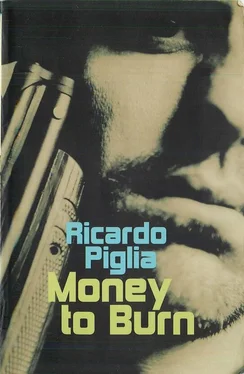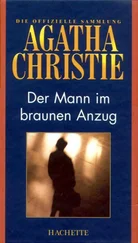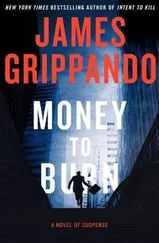Ricardo Piglia - Money to Burn
Здесь есть возможность читать онлайн «Ricardo Piglia - Money to Burn» весь текст электронной книги совершенно бесплатно (целиком полную версию без сокращений). В некоторых случаях можно слушать аудио, скачать через торрент в формате fb2 и присутствует краткое содержание. Год выпуска: 2004, Издательство: Granta UK, Жанр: Современная проза, на английском языке. Описание произведения, (предисловие) а так же отзывы посетителей доступны на портале библиотеки ЛибКат.
- Название:Money to Burn
- Автор:
- Издательство:Granta UK
- Жанр:
- Год:2004
- ISBN:нет данных
- Рейтинг книги:5 / 5. Голосов: 1
-
Избранное:Добавить в избранное
- Отзывы:
-
Ваша оценка:
- 100
- 1
- 2
- 3
- 4
- 5
Money to Burn: краткое содержание, описание и аннотация
Предлагаем к чтению аннотацию, описание, краткое содержание или предисловие (зависит от того, что написал сам автор книги «Money to Burn»). Если вы не нашли необходимую информацию о книге — напишите в комментариях, мы постараемся отыскать её.
Money to Burn — читать онлайн бесплатно полную книгу (весь текст) целиком
Ниже представлен текст книги, разбитый по страницам. Система сохранения места последней прочитанной страницы, позволяет с удобством читать онлайн бесплатно книгу «Money to Burn», без необходимости каждый раз заново искать на чём Вы остановились. Поставьте закладку, и сможете в любой момент перейти на страницу, на которой закончили чтение.
Интервал:
Закладка:
At that moment, Mereles came out of the room.
'What are you up to, dickhead?' he asked the Gaucho, who seemed to be in a dream. 'Come on. We've got to go down and make a phone call.'
They'd decided not to pay out and to stuff everyone else. That was why Malito had determined to change plans and get him to ring Twisty Bazán. It was six o'clock on the Thursday morning. He didn't let him tell Twisty where they were holed up, but he sent him along to meet Fontán Reyes in a bar on Carlos Pellegrini and Lavalle, so as to keep him occupied while they shifted themselves to the other safehouse. He gave the order to depart and regroup at Nando's house over in Barracas. That was where they intended to wait until the new network was in place to get them over to Uruguay.
Tall, skinny, with his vulture's eyes and a superior smile on his lips, Twisty Bazán was arrested three hours after the call. To cover himself, Silva said Bazán had been detained in the vicinity of the square where the robbery had taken place. He had a weapon on him. He said he was carrying the gun 'to kill the stray dogs that have overrun Hurlingham'. The truth is he was a police informer. Silva had had him hooked for over a year as a nark, in return for leaving him free to circulate the Bajo among the drugs and the whores.
4
Next day the newspapers carried pictures of Police Commissioner Silva in the act of identifying the corpse of Twisty Bazán in a bar beside the harbour. His pronouncements were both sententious and contradictory (mutually incompatible, even), as befits a perfect example of police logic.
'In this country criminals fall to killing one another in order to avoid coming to justice. We are on the trail of the gang of assassins who robbed the San Fernando bank and their hours are now numbered.'
The commissioner wore a crumpled suit and had a bandage on one hand. He'd not slept for two nights and had fractured his hand hitting Mereles' harlot, who had refused to cooperate and spent the entire interrogation spitting and swearing. She was only a kid, a real brat set on playing the heroine, and in the end he'd had to hand her over to the judge with almost nothing to show for his efforts. He'd broken a bone in his knuckle in throwing the first punch and his hand was now swollen and painful. He asked for ice at the bar and tied the cubes into a white napkin to hold against it. Then he turned to glower at the journalists.
'You wouldn't happen to think…' began the lad who wrote up the police reports for El Mundo.
'I don't think, I investigate,' Silva cut him short.
'They say he was a police informer.' The lad was really only a curly-haired boy, wearing his press pass on the lapel of his corduroy jacket, which clearly read Emilio Renzi or Rienzi. 'And they also say that he'd been pulled in and detained… Who gave the order to release him?'
Silva glowered again, holding his wounded hand to his chest. Of course it was he who'd released Twisty to use him as bait.
'He's a criminal with a police record. And he was never detained…'
'What's happened to your hand, police commissioner?'
Silva struggled to find a reply that would appear convincing to the lad in front of him.
'I put it out when I was thumping fucking journalists in the balls.'
Commissioner Silva was a fat fellow, with proletarian features, a white scar blazed across one cheek. The story of his scar returned to him every morning when he looked at his face in the mirror. A madman had cut him one evening, just because, as he was leaving his house. The bastard breathed down his neck and threatened him with a blade, without realizing that he was a cop. When he did realize it, matters only got worse. The problem is always the other party's fear, the delirium of some guy who reckons he's been cornered and that there's no way out for him. They went on out on to the street and, before taking his car, the fellow opened his face with a diagonal slit. It was as if he'd been burned, he felt an icy fire, something slashed his jaw and he was left with a permanent scar.
These days he lived alone, his wife had left him years earlier and occasionally they'd meet up and he'd hardly recognize her when she sometimes brought the children over. He watched them grow up with indifference, as if they were strangers; alienated from anything that wasn't about work. Silva knew that in his job you couldn't beat about the bush. And this time he'd kept his hands free.
'This time there needs to be a swift outcome,' his boss had told him. 'You've carte blanche not to worry about what the judges may have to add to the proceedings.'
There was a lot of pressure to bring about an arrest.
'I'm up to here with journalists, and I'll have to call a press conference.'
'You got any clues?'
Commissioner Silva set off by car for Entre Ríos Street via Moreno Street, outside working hours. It was nearly nine at night. He drove calmly. The city was quiet. Crime, robbery, adultery, everything taking place, so you go about your business, you hit the streets and it all looks normal, has that false air of tranquillity that the other passers-by themselves bestow.
Silva would often stay up until dawn, at home, without being able to get to sleep, staring out at the city through the window, in the dark. Everyone tries to cover up evil. But evil lies in wait around every corner, and within every house. He now lived in a top floor flat on Boedo Street and the lights burned in houses and apartments through the dawn, reminding him of all the crimes that would be front-page news in the next morning's dailies.
Twisty's execution was the last straw that signalled the gang's retreat. The lesson couldn't have been plainer: they were going to kill anyone who stood in their way, or whom they had the good fortune to pull in. Nando Heguilein had remained in the rearguard, covering their final moves and distributing the money to cover the crossing to Uruguay. Everything was going badly and smelt of danger; the police raiding and requisitioning the safehouse on Arenales Street and then Blanca's capture — she was there in the house — enraged Mereles, who went as far as to consider staying in Buenos Aires to confront Silva along with all the other stoolies who spied on behalf of the armed police. Malito imposed a degree of calm: now, more than ever, they had to use their intelligence and not allow themselves to be provoked.
Silva had picked up Fontán Reyes in the Esmeralda, a bar on Carlos Pellegrini Street, much frequented by tango players. The bar was close to the SADAIC{9} and you could always spot the young rising stars and the old fading ones, now retired from the world of entertainment. When Silva came in with his own armed gang, everyone in the place froze, as if immobilized inside a bell jar. That was the sensation he produced every time he went into a dive like this. Silence, slow motion, expressions of fear.
Fontán Reyes was an elegant sort, despite carrying a number of excess kilos and the lit-up look of a drug addict. Silva approached and sat down beside him.
'You seem to be nervous. Thaťs logical. Everyone turns nervous when I approach to speak to them,' said the commissioner.
This was the way (according to the papers) he could figure out how the robbery on the Town Hall was planned. The lead came from the Executive Committee, via Councillor Carlos A. Nocito, thirty-five years of age, married, the fraternal cousin of Atir Omar Nocito, alias Fontán Reyes, employed as a Public Works inspector in the San Fernando district. He was a man of influence, someone given to granting favours in the borough, a typical example of a local politician who flirted on the brink of illegal activity. In another situation, he would have been a mafioso , but here he dedicated himself to petty business deals: bribery and protection rackets; the illegal lottery; underworld brothels. He was a member of a gambling den in Olivos, servicing their interests along various points of the coast, and was himself the son of don Máximo Nocito, alias Nino, president of the San Fernando Council Executive Committee, voted in by the Popular Unity party. Detained and interrogated, Nocito ended up finally admitting that he'd met with the 'ranchers' introduced to him by his cousin Fontán Reyes, and that he'd spoken to them regarding the assault on the district's wages officers. Their meetings were held in a luxury apartment on Arenales Street.
Читать дальшеИнтервал:
Закладка:
Похожие книги на «Money to Burn»
Представляем Вашему вниманию похожие книги на «Money to Burn» списком для выбора. Мы отобрали схожую по названию и смыслу литературу в надежде предоставить читателям больше вариантов отыскать новые, интересные, ещё непрочитанные произведения.
Обсуждение, отзывы о книге «Money to Burn» и просто собственные мнения читателей. Оставьте ваши комментарии, напишите, что Вы думаете о произведении, его смысле или главных героях. Укажите что конкретно понравилось, а что нет, и почему Вы так считаете.












